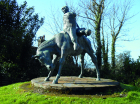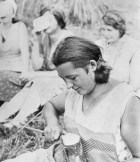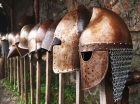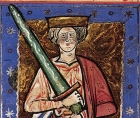Using enquiry questions
Many history departments use enquiry questions as an essential device for structuring their planning. Enquiries – built on the basis of genuine, worthwhile historical questions that the students are ultimately required to answer – often form the basic units within schemes of work, with each enquiry lasting several lessons/weeks. A good question will make clear not only the substantive focus of the enquiry but also the particular second-order or disciplinary concept that the students are dealing with. This approach allows teachers to plan effectively across key stages, clearly identifying where and when they are focusing on particular concepts, making it easier to plan for progression; ensuring, for example, that a Year 9 enquiry question about similarity and difference across the British Empire builds on and extends the analytical framework used to explore similarity and difference in a Year 8 enquiry about the Mughal Empire. The materials in this section include detailed examples of individual schemes of work built around different kinds of enquiry questions, along with examples of larger curriculum plans conceived of in terms of a series of well-designed enquiry questions. Read more
-

Unpacking the enquiry puzzle
ArticleClick to view -

Broadening Year 7’s British history horizons with Welsh medieval sources
ArticleClick to view -

How representing women can convey a more complex narrative of the Russian Revolution to Year 9
ArticleClick to view -

Creating a progression model for teaching historical perspectives in Key Stage 3
ArticleClick to view -

Why does anyone do anything? Attempts to improve agentive explanations with Year 12
ArticleClick to view -

Film: What's the wisdom on... Enquiry questions (Part 2)
ArticleClick to view -

Film: What's the wisdom on... Enquiry questions (Part 1)
ArticleClick to view -

What’s the wisdom on… enquiry questions
ArticleClick to view -

Historical scholarship, archaeology and evidence in Year 7
ArticleClick to view -

Modelling the discipline
ArticleClick to view -

Anatomy of enquiry: deconstructing an approach to history curriculum planning
ArticleClick to view -

Making rigour a departmental reality
ArticleClick to view -

Shaping the debate: why historians matter more than ever at GCSE
ArticleClick to view -

Developing independent learning with Year 7
ArticleClick to view -

Interpreting Agincourt: KS3 Scheme of Work
ArticleClick to view -

Exploring big overviews through local depth
ArticleClick to view -

Developing transferable knowledge at A-level
ArticleClick to view -

Assessment after levels
ArticleClick to view -

New, Novice or Nervous? 153: Good Enquiry Questions
ArticleClick to view -

Knowledge and the Draft NC
ArticleClick to view

